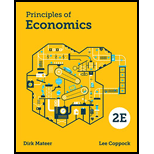
To explain:
The concept of bounded rationality and its relevance in economic modeling.
Explanation of Solution
Basically, many of the assumptions are toned down by bounded rationality that goes into homo economicus. The idea that a behavior may breach a rational precept or fail to fit to the norm of optimal rationality, but it is nonetheless compatible with the pursuit of a suitable set of objectives or aims. Of course, this concept is not completely adequate in that it does not specify either the precept being breached or the circumstances under which a set of objectives maybe deemed suitable. But in these ways, the notion of bounded rationality has somewhat always been undefined. In this particular phenomenon that boundlessly rational behavior can be made to look completely reasonable by extending the range of issue of choice to which it is viewed as a response has resulted some commentators to suggest that models of ideal decision making are sufficient for social science reasons as long as the setting in which an agent chooses is always defined as "in full".
This concept is relevant in economic modeling as many economic models suppose that individuals are rational on average and can be approximated to behave as per their preferences in enough amounts. This hypothesis is revised by the notion of bounded rationality to account for the reality that completely rational choices are not often viable in theory due to the illogicality of natural choice issues and the limited amount of assets that are available to make them. The theory of rational choices or models of political agencies presume that human beings can be approximated or described as "rational entities".
Bounded rationality:
The rational choices a person makes within the boundaries of data and that depends on the mental capacity is called bounded rationality. Simply, the concept that is faced by the limitations, the human cognitive decision making can never be completely rational.
Want to see more full solutions like this?
Chapter 17 Solutions
Principles of Economics (Second Edition)
- What good is economic theory if it can't predict the behavior of a specific individual?arrow_forwardWhich of the following statements about economic models is correct? a) models are built to mirror exact reality b) models are useful, but they should not be used for the purpose of improving public policies c) models seldom incorporate equations or diagrams d) economic models omit many details, therefore they allow us to see what is truly importantarrow_forwardWhat are the human behaviors economists should observe when creating economic models?arrow_forward
- Which of the following is an INCORRECT statement regarding economic models? An economic model is useful if it predicts well, even if its assumptions are not realistic. An economic model is useful even if it predicts with less than100 percent accuracy. An economic model always includes all of the details of the economic world. An economic model is especially useful when dealing with positive economic analysis.arrow_forwarddifference between macroeconomics and microeconomics.arrow_forwardDifferentiate between an exogenous variable and an endogenous variable in an economic model? Why isn’t it useful to construct an economic model that contains only exogenous variables (and no endogenous variables)?arrow_forward
- In what ways do human decision making differ from rational conventional economic theoryarrow_forwardWhat is the contributions of Paul Samuelson to the history of economic thought?arrow_forwardWatch on YouTube Questions: A) Detail and describe a decision that you made in the past that contradicts the assumption of rationality in standard economic theory? How and why was it irrational according to standard economic theory?arrow_forward

 Economics Today and Tomorrow, Student EditionEconomicsISBN:9780078747663Author:McGraw-HillPublisher:Glencoe/McGraw-Hill School Pub Co
Economics Today and Tomorrow, Student EditionEconomicsISBN:9780078747663Author:McGraw-HillPublisher:Glencoe/McGraw-Hill School Pub Co Economics (MindTap Course List)EconomicsISBN:9781337617383Author:Roger A. ArnoldPublisher:Cengage Learning
Economics (MindTap Course List)EconomicsISBN:9781337617383Author:Roger A. ArnoldPublisher:Cengage Learning







